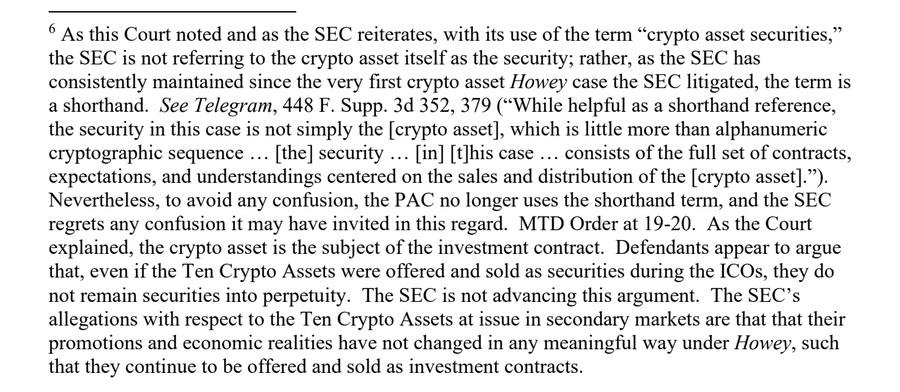- Coinbase CLO criticizes the SEC’s inconsistency in classifying crypto tokens as securities in a surprising legal twist.
- Grewal highlights the SEC’s confusion about Ethereum’s special treatment, leaving the crypto community in uncertainty.
The United States Securities and Exchange Commission (SEC) has recently come under fire for its contradictory stance on the classification of cryptocurrencies as securities.
According to Good Morning Crypto, an influential voice in the cryptocurrency industry, the SEC has spent hundreds of millions of taxpayer dollars suing numerous crypto firms in the United States over the last four years, categorizing each coin as a “crypto asset security.”
However, in an unexpected move, the SEC has stated that it never intended to imply that cryptocurrencies are securities, leaving the crypto world bewildered by this abrupt shift in narrative.
SEC: We spent hundreds of millions in taxpayer money over four years relentlessly suing every crypto company in the U.S., labeling every crypto as a “crypto asset security.”
Also SEC: We apologize for any confusion—at no point did we intend to suggest that crypto assets are… https://t.co/WHXdKR0xUN
— Good Morning Crypto (@AbsGMCrypto) September 13, 2024
Coinbase CLO Highlights SEC’s Contradictions in Crypto Lawsuit
The reaction from Good Morning Crypto was spurred by a tweet from Chief Legal Officer of Coinbase, Paul Grewal, who mentioned an important paragraph in the SEC’s amended lawsuit against Binance.
Grewal stated that the SEC “regrets any confusion it may have invited” by mistakenly and frequently declaring that crypto tokens are securities. Grewal’s tweet highlighted the discrepancy in the SEC’s approach, which has long maintained that tokens are securities through enforcement proceedings.

He also speculated on how this unexpected disclosure would effect other legal experts, including Stuart Alderoty, Ripple’s Chief Legal Officer, who has been significantly involved in defending Ripple against the SEC’s XRP charges.
Grewal was clearly frustrated, remarking that the SEC’s shift in attitude was buried in Footnote 6 of the amended complaint, potentially undermining years of regulatory activity and court battles.
Grewal Questions SEC’s Ambiguity on Ethereum and XRP Regulation
Grewal also asked a vital question concerning Ethereum (ETH), the second-largest cryptocurrency by market cap. He highlighted that, despite years of regulatory ambiguity, Ethereum’s status as a non-security appears to have altered, allowing it to dodge the kind of scrutiny that other cryptocurrencies, like XRP, have received.
Grewal sarcastically remarked that the SEC “appears to have a mysterious knowledge of why ETH differs from other tokens,” implying that the general public will only learn the explanation if the agency sues them.
His statements highlight the opacity with which the SEC has handled cryptocurrency regulation, leaving sector players unsure of the legal framework guiding their operations.
The SEC’s inconsistencies have sparked fresh criticism from the cryptocurrency sector. The Coinbase CLO also highlighted the SEC’s conflicting behavior. He expressly mentioned that the SEC had classified XRP as a security in the opening paragraph of its complaint against Ripple.
This assertion was essential to Ripple’s long-running legal struggle with the SEC, so the agency’s quick clarification was all the more unexpected. According to Grewal, the SEC’s actions indicate an intentional attempt to deceive the courts and the public, prompting many to question why the agency is now retreating.
Adding to the confusion, a CNF report gives more information on the SEC’s shifting posture. The agency recently updated its lawsuit against Binance, Binance.US, and CEO Changpeng Zhao, altering its stance on the classification of certain cryptocurrency assets.
The SEC recognized that tokens like Solana (SOL), Cardano (ADA), and Polygon (MATIC) are not inherently securities. This represents a substantial shift from the SEC’s previous position, which claimed that many of these tokens were being offered as unregistered securities.
The government has clarified that the term “crypto asset security” refers to the contracts and agreements that govern the selling of tokens, not the tokens themselves.
No spam, no lies, only insights. You can unsubscribe at any time.
Credit: Source link
































